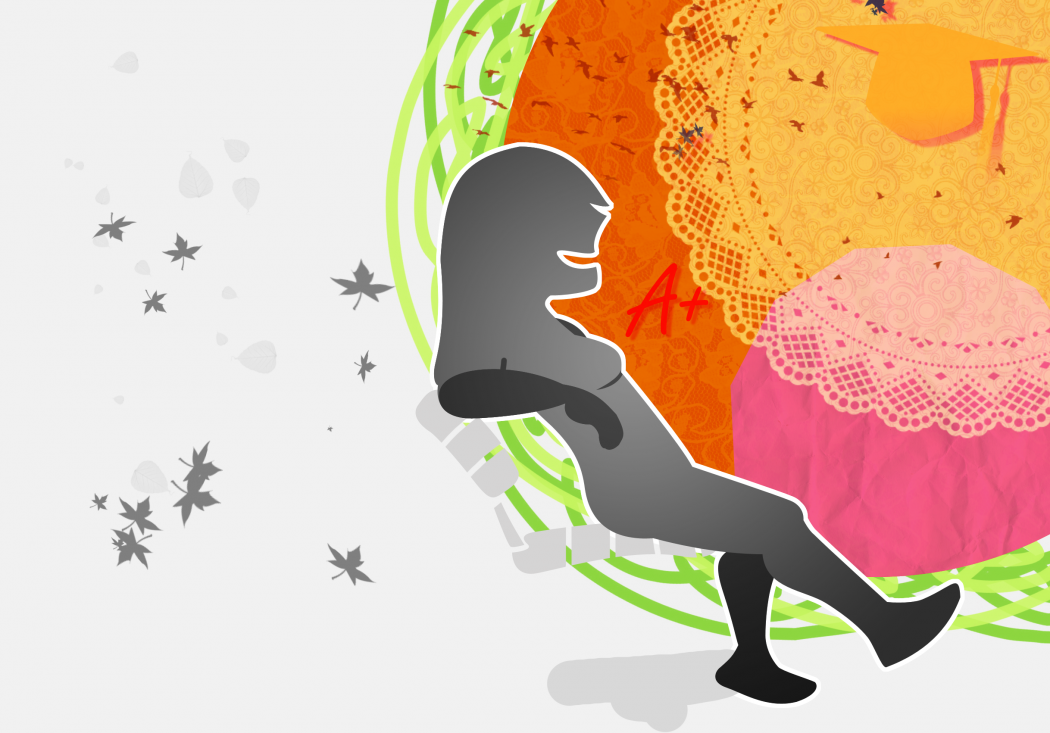When I ran for student government in Grade 11, I didn’t expect that winning would entail a pool party with eight quasi-strangers. Nevertheless, there I sat with my fellow executives, musing how this get-together felt like an odd high school version of a corporate mixer. As I had resolved to “put myself out there” my senior year, I readied for a familiar cycle: gauge the social dynamics, search for a fitting remark, assess their reactions, rinse and repeat.
It was a simple enough formula, one that I had employed multiple times in the past. What I wasn’t prepared for, however, was the chaos of eight self-proclaimed leaders all striving to make their mark on a discussion. Reference after reference and joke after joke, I scrambled to sift through the innumerable ideas whizzing past. Though I longed to contribute to the animated conversation around me, I felt like a leaf in a tornado. Nothing seemed to come out.
Sadly, this incident was not an anomaly; there have been many times in which I have been overwhelmed by excessive social stimulation and failed at fulfilling some personal goal. Growing up, I’ve frequently grappled with this inner barrier. From hearing, “Do you hate us or something?” to “You’re so quiet,” I learned that reticence was not an admirable quality. When my teachers then advised me, “Give it time” and “It’ll come with maturity,” I developed the impression that introversion was a shortcoming I would eventually outgrow.
Contrary to popular belief, introverts are not automatically shy in the same way that extroverts are not automatically outgoing. Instead, I’ve since learned that the introversion/extroversion paradigm describes the inclinations of the unconscious mind. In 1921, Carl Jung introduced this dichotomy as such: while the extrovert generally receives energy from the external world of interpersonal relations, the introvert gravitates to the internal world of conceptual abstraction. In this way, one’s propensity to introversion or extroversion is not reliant upon how they choose to act, but how they’re oriented to act due to their natural processes.
Although this typology underlines the unique strengths of either end of the spectrum, Western society undeniably glorifies the extrovert. Just think of the images, TV shows, and movies pervading our media. From a young age, we are conditioned to idealize the confident, outgoing leader who thinks on their feet and navigates social situations with ease. Indeed, people who fit this model have certainly risen to stardom, such as Steve Jobs, Martin Luther King Jr., and Oprah Winfrey.
There are countless dignitaries who have made groundbreaking impacts on our society, yet are not the paragons of charisma romanticized in the media.
But what about the strong and silent type? Bill Gates, Warren Buffett, Rosa Parks—there are countless dignitaries who have made groundbreaking impacts on our society, yet are not the paragons of charisma romanticized in the media. Put simply, accomplished individuals are less often associated with success when they don’t display overt interpersonal dispositions.
Today, this social bias is increasingly criticized by authors and scholars alike. As noted by Susan Cain, for example, Western institutions are designed specifically for those who thrive in social environments. In elementary school, kids are grouped into pods of desks and forced to collaborate in group projects; in the workplace, promotions are more frequently bestowed upon dominant, outspoken employees; in politics, potential leaders are often judged by their charismatic abilities and public personas before their actual policies.
Due to this ubiquitous esteem for extroversion, it is thus understood that one must self-advertise, network, and display the hallmark traits of the extrovert to advance in our society. For the many introverts with an innate desire to achieve, this raises a certain dilemma. What happens when one is drawn to the ladder of success, but is met with an opposing way of functioning as a prerequisite to climbing it? Within such an individual, the result is a conflict between a preference for less social stimulation and—knowing that networking leads to greater opportunities—a self-imposed pressure to pursue more.
However, rejecting one’s introverted tendencies risks wasting an incredible potential for ingenuity and leadership.
For the high-achieving introvert, it is common to find oneself resenting the latter part of this moniker. Admittedly, I have pondered how my life would change if I was “liberated” from my introversion: I would be free to engage in small talk without feeling antsy, give a response in class without mentally reciting my answer beforehand, and chat it up at networking events without becoming drained. It’s easy to fall into this way of thinking, especially considering the ideal personality instilled in us by society. However, rejecting one’s introverted tendencies risks wasting an incredible potential for ingenuity and leadership.
Diverging from commonly-held attitudes, the “undesirable” wiring of the introvert holds untold advantages. While extroverts often delve into multiple interests before moving on, introverts take the more cautious approach, weighing expectations and various courses of action in advance. This fastidious selectivity logically bears deeper and more specific proficiencies. Hence, our knowledge is much less likely to be surface-level; if an introvert finds a subject that they’re truly passionate about, they will zero in on that field and explore all of its related facets. When this specialized expertise is then complemented with our higher levels of cortical arousal and preference for solitude (a key ingredient to creativity), the results are trailblazing innovations.
Next, when it comes to leadership positions, the introvert verifies their absolute competence before even contemplating running for that role. Pairing this ensured know-how with a lower tendency to be commanding, the introverted leader can truly be an asset. Indeed, a passive group of followers may benefit from an extroverted leader, but a proactive group of creatives flourishes under an introverted leader. Essentially, introverts are better-suited to oversee highly-skilled individuals on highly-specialized projects, making us a commodity among people who want to be a “leader” for the title’s sake.
With this in mind, researchers describe introverts as “a minority in the regular population but a majority in the gifted population.” Unfortunately for introverts and for society, biases for extroversion cause us to be undervalued and passed over. As introverts also tend to shy away from self-promotion and leadership, this social disregard is furthered in a negative feedback loop.
This is where the “high-achieving” qualifier comes in. For an introvert especially, the drive to seek out opportunity in spite of personal unease is invaluable to success, both objective (as in status) and subjective (as in satisfaction). As the reversal of institutional biases seems unlikely in the near future, it’s regrettable but imperative that we play the games required to advance.
Thus, in a society already stacked against the introvert, it’s illogical to compound one’s struggles by fighting one’s natural way of functioning. Instead, high-achieving introverts ought to embrace their unique introversion-borne faculties and exercise their ambition to do them justice. Though such individuals will have to venture beyond their comfort zone (for example, temporarily shrugging on the cloak of extroversion to engage in social pandering) this is a small price to pay for the accomplishment of one’s goals.
To close, a message to my fellow high-achieving introverts: while it may be necessary that you fake it until you make it, may you never lose sight of what makes you tick. Whatever happens, don’t let our extrovert-centered society stop you from setting your sights on the highest mountains possible. In combination, introversion and ambition can be a blessing or a burden; it’s up to you to find your balance.
–
For those interested, here are some related readings/viewings on the topic:
- Susan Cain’s critically-acclaimed novel (Quiet: The Power of Introverts in a World that Can’t Stop Talking)
- Susan Cain’s TED Talk (“The Power of Introverts”)
- Katie Rasoul’s TED Talk (“Uncovering the High-Achieving Introvert”)
- Jennifer Granneman’s article (“Why Introverts and Extroverts Are Different: The Science”)








